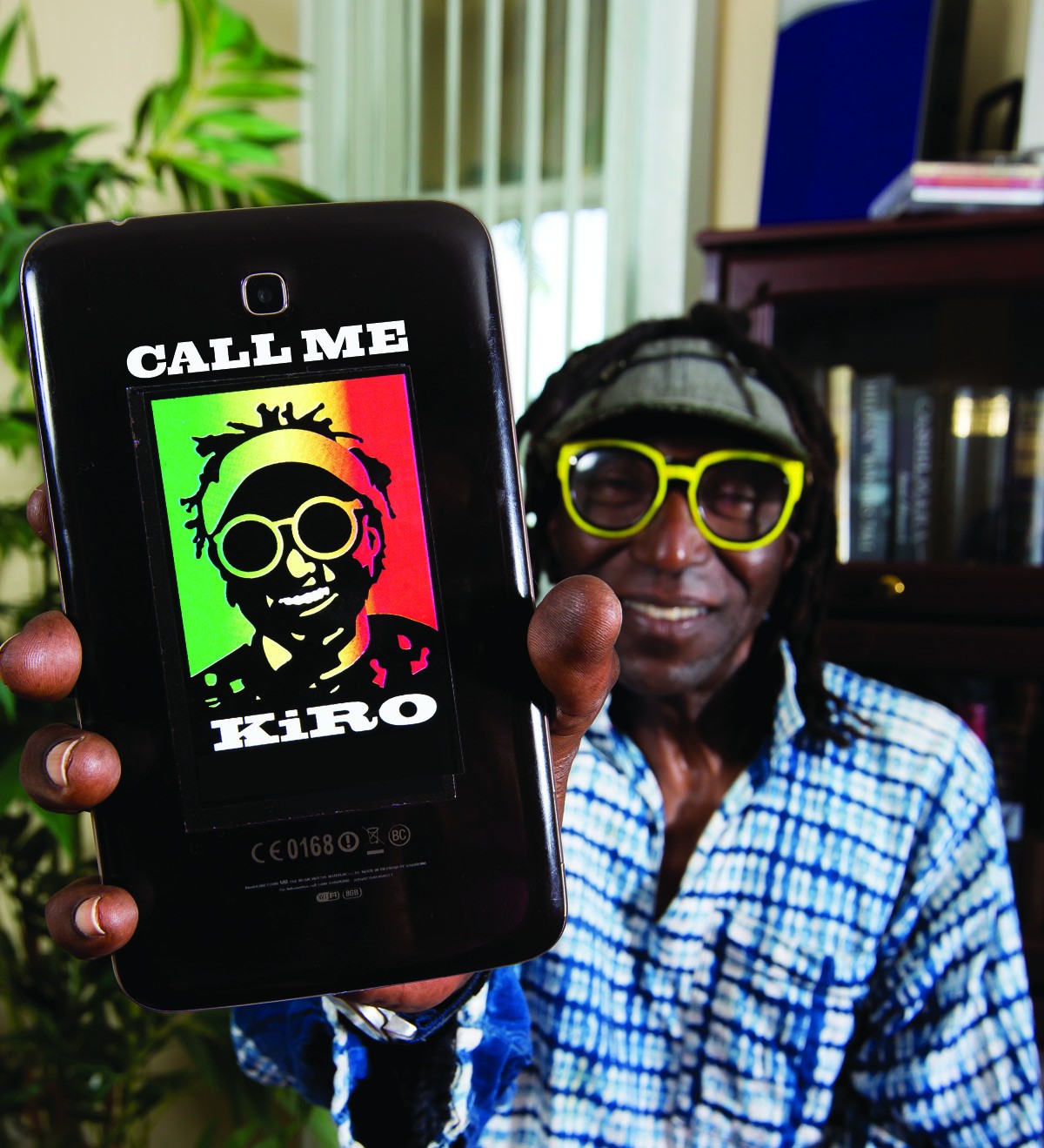
It’s hard to not look at the smiling face of Bigira Mustapha Prince David Willy Kirokiro without feeling a little bit better about life. It’s rare to meet a human so magnanimous, especially one so iconic to a locale that his face is printed on vinyl slaps, inspiring onlookers to consider celebration, simplicity and life itself while also promoting Orange County’s only African arts and accessories store.
“Everyone should have a Kiro sticker on your bike, bumper of your car or dashboard,” says the man dubbed Kiro with the energy of a salesman in a thick Rwandan accent. “It will remind you that life is life: be calm; respect what you have; have tolerance, discipline and work; and Jah will fix everything.”
Chances are you have seen Kiro’s beaming face slapped on a local restaurant, street sign, skateboard or van in the familiar Rasta color palette of green, yellow and red. You may be familiar with his YouTube channel, African Corner TV, and Kiro’s sprawling videos, including interviews of known musicians and locals whom he treats like rock stars, and diary-like footage of fashion shows, drum circles, belly dancers and sunset drives along the Huntington Beach coast while blaring Peter Tosh. Maybe you’ve heard him yelping his signature catch phrase—”OOOOOooooooopppsssss!”— in a sustained, universally uplifting note celebrating joy and error that draws in friends and strangers.
But his warm demeanor and constant cheerfulness belie the fact he has narrowly defied death on multiple occasions. He has survived three wars, including the genocide that forced him to flee to America more than two decades ago. He has stayed sharp, kind and lucky, keeping the appearance of being carefree while always being hyperaware of his surroundings. Despite efforts by many to end his life or shut him down, the 69-year-old’s light burns brighter than his trademark yellow-rimmed sunglasses.
* * * * *
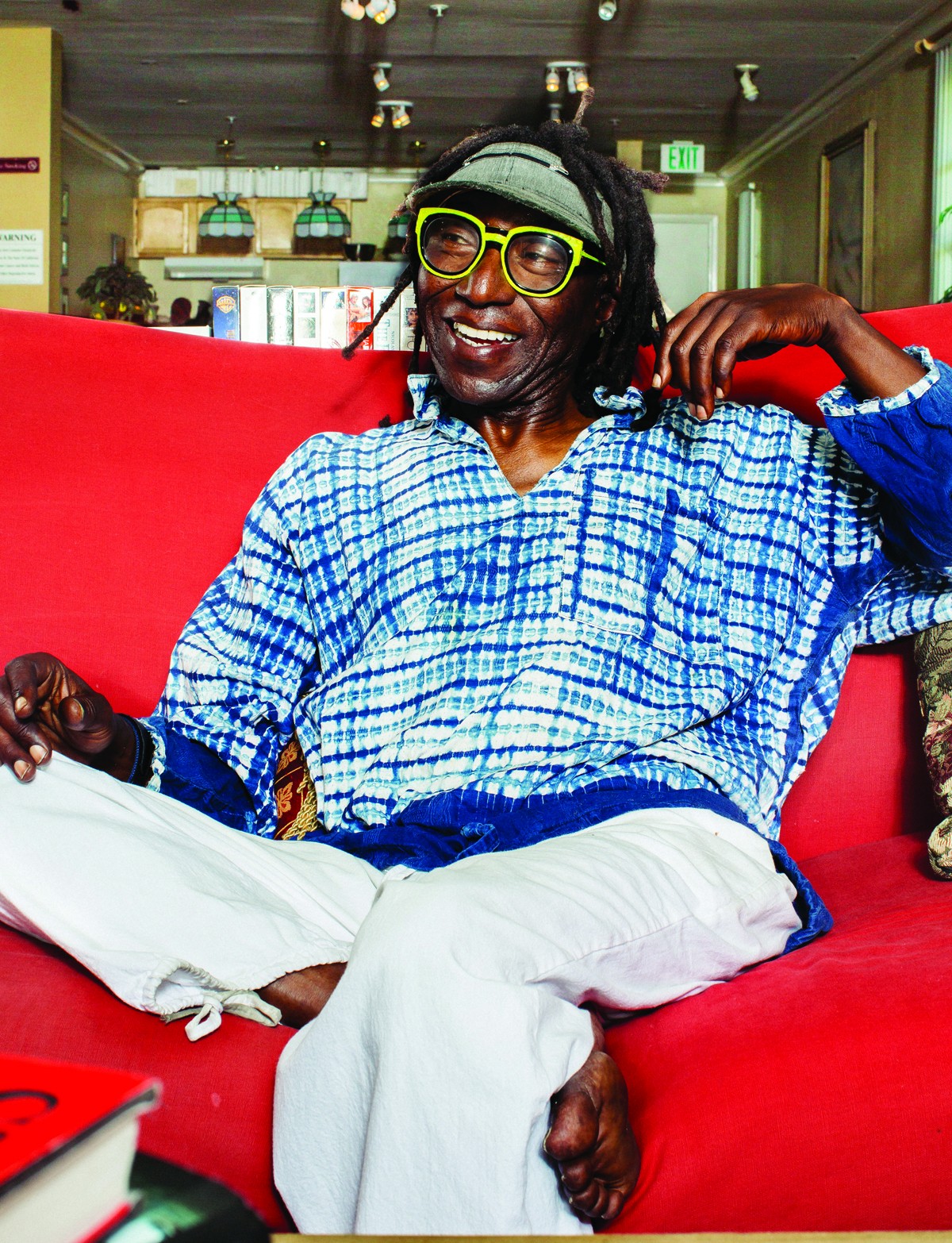
In May 1994, Kiro was in Washington, D.C., on the brink of an uncertain future. The African refugee narrowly escaped the genocide of his people, the Tutsi tribe. Even CBS news anchor Peter Jennings, who befriended Kiro while on assignment in Rwanda, warned him against returning during wartime. He settled in D.C., staying near the Pentagon, but he was homesick for his wife and children; Kiro ignored Jennings’ advice and returned to his war-torn country that summer. What he found was the heaviest violence he’d ever witnessed just three days after touching down in Africa.
The spring and early summer of 1994 brought terror and tragedy to the people of East Africa, specifically Rwanda, Burundi and the neighboring Congo. The Hutu government came to power in Rwanda in the early 1960s after the region won independence from Belgium following decades of colonial rule that tore the region apart with intentionally created conflict between the area’s three main tribes. The Hutu were the largest tribe, at nearly 80 percent of the population. Minority tribes included the Tutsi and the Twe. Friction between the tribes was created by the Belgian colonial regime, who gave minimal privileges to minority tribes in an effort to avoid an uprising; they believed if the majority even thought they could gain power, they would rebel.
Because of this, the Belgian government went out of its way to oppress the Hutu more and treat the minority tribes in ways that would make the Hutu envious. In the 1990s, Hutu extremists acted on a longstanding plan for genocide on the Tutsi people. It’s estimated that 500,000 to 1 million Rwandans were killed in a 100-day span between April and July—70 percent of the Tutsi people and 20 percent of Rwanda’s overall population. In the wake of unsuccessful attempts to help during political instability in Somalia, the American government and military were hesitant to act.
When he returned to Africa, locals who knew Kiro were aware that he was Tutsi. Unable to take anyone with him because of travel restrictions, he grabbed a backpack and fled once again, hoping to return shortly and gain permission to bring more of his loved ones to safety in the US. However, by the time he boarded a plane to escape back to the U.S., Hutus had already destroyed his village. Among the dead were Kiro’s wife, his youngest child, and hundreds of friends and relatives. It took years for Kiro to reunite with his eight remaining children, seven of whom currently reside in the U.S. (one remains in Rwanda).
Only 20 Tutsi refugees made it to Orange County on asylum through the Catholic Relief Fund. “I was forced to come here,” Kiro recalls, perched atop a bright-red couch set directly in the middle of a common room filled with wooden furniture and VHS tapes at the Newport Beach senior-citizen apartment complex where he currently resides. His signature sticker-worthy smile is temporarily muted as he recounts the dark days during the genocide against the Tutsi, speaking emotionally with bold hand gestures.
[
But his sadness subsides, and his upbeat, Kiro-esque attitude prevails. “My dad was supposed to be a king . . . what a position,” he says with a wry smile. “So you are talking to a little prince!”
Starting over in a new country, he returned to doing what he did best: selling African tourist goods. In Rwanda, Kiro had a shop selling masks, clothing, and such trinkets as local percussion instruments and mini statues. It was at the bottom of an active volcano near Lake Kivu, a place rumored to be rich with natural resources that, according to Kiro, never got a chance to be tapped into by the Tutsi people. This is where he met Western news anchors covering the civil war, including Jennings, who interviewed and befriended him and pushed for Kiro’s entry into the U.S.
Once in California, he opened shop at a San Diego swap meet and eventually inside a strip mall in OC in the late ’90s. Located in Costa Mesa, African Corner resembled the store near the volcano, which he lost during the genocide. Rows of pungent incense lined the walls near mannequin heads topped with bright Rasta beanies, Bob Marley posters, cubbies of handmade jewelry; statues glinted in the sunlight from the window as customers walked through the door.
After years of selling djembes as souvenirs for tourists, Kiro looked at the drum with new eyes while putting the pieces of his new life together. “Drums are universal,” Kiro explains, “You can play guitar, but some countries, they don’t play guitar. You can play saxophone, but some countries don’t play saxophone. You can play flute; some countries, they don’t even want to play flute! But drums are the base of music. They are everywhere!”
* * * * *
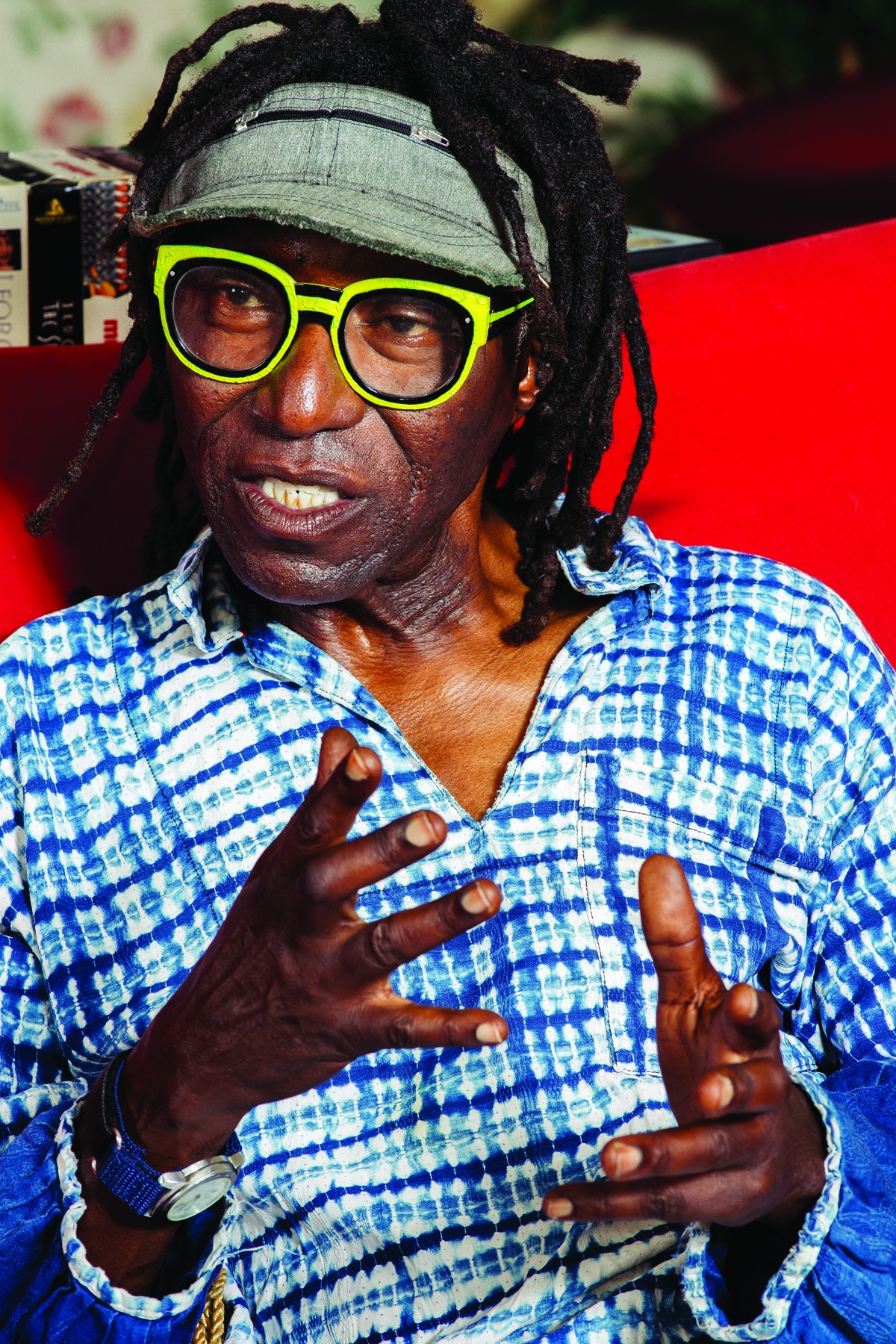
Kiro taught himself how to play by messing around, pounding out the rhythm by hand to reggae, dancehall and jazz albums in his shop. “Music is the way to communicate with the people and to meet people easily,” he says. Since teaching himself to play, Kiro has performed at countless drum circles and with many bands. He says he even jammed with the late legendary blues guitarist B.B. King.
Music became an avenue to making friends around OC. Kiro started hosting drum circles, quickly earning him a dedicated following of stoners and eager hand drummers with passion but no community. His drum circles started drawing such large crowds that the police shut them down on more than one occasion. “It was so popular!” Kiro remembers, focusing on one night when he invited 40 people to an event at his store in Costa Mesa, but, he estimates, nearly 300 showed up. The police told Kiro that he didn’t have permission for an event that large and advised him that he could be ticketed up to $3,000 if it happened again.
In 1998, Kiro decided he needed a larger space. His girlfriend at the time suggested renting space at the Westminster Mall after seeing an ad while shopping with friends, so Kiro met with the management, who told him they wouldn’t rent to him without credit. He went to each department store and got approved for cards at Sears, JC Penney and Macy’s that day. He returned to the manager’s office, and within a few hours, he signed a contract.
The new store was a mix of African tourist goods, percussion and a head shop, which did well during the ska- and reggae-obsessed Orange County of the 1990s. But then mall management changed their policies, hoping to push African Corner into signing a non-negotiable 10-year lease with a rent increase. Kiro refused to get locked into a contract he didn’t believe he could deliver on, so the Westminster Mall replaced African Corner with Perfume Corner.
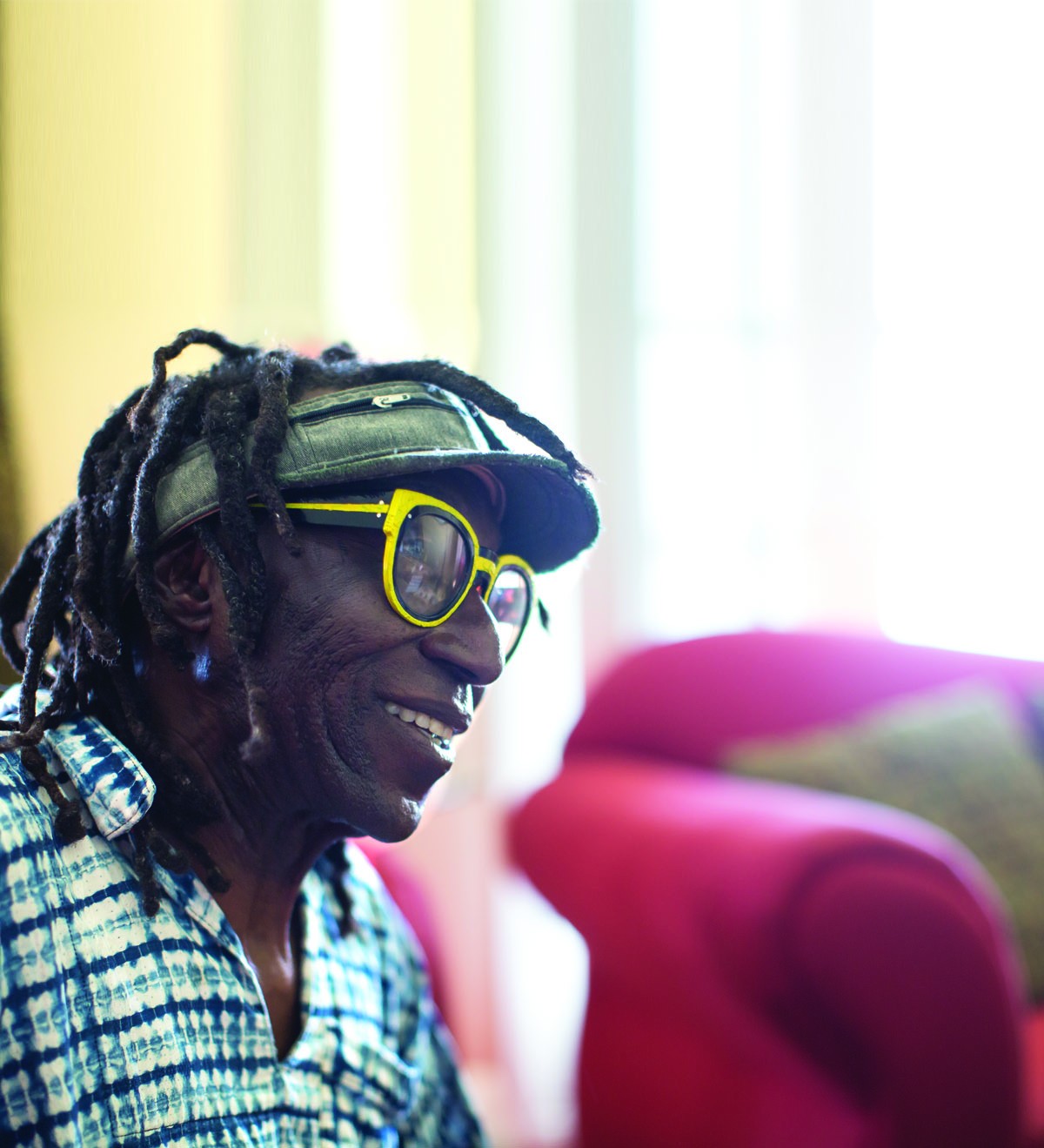
The store relocated to Fountain Valley in 2006, and Kiro quickly became a cult figure for local musicians and artists. Located in a quaint strip mall off Brookhurst and Heil, African Corner’s business-park neighbors were a motley mix of immigrants, hippies and freaks. It was nestled among a video store, a tattoo and piercing shop, a Chinese food restaurant, and Au Lac, one of OC’s most cherished vegan restaurants.
The Fountain Valley location became a haven for young cannabis enthusiasts, drummers, and local teens and young adults who felt like outsiders. Pictures of people from all walks of life lined his shop: photos of Kiro with celebrities and political figures, pimple-faced 18-year-old boys, yacht-club yuppies, businesswomen, friends made at drum circles all over OC, and even a few punks with mohawks and patched vests.
In 2008, reggae band the Originalites formed after hanging out Friday nights at Kiro’s drum circles. “We technically formed at Fountain Valley High School,” says drummer and founding member Peter Fontes, “but Kiro gave us a place to play live. The last seven years of what we did as a group came directly from African Corner and Kiro.
[
“Kiro was like our teacher and spiritual guide,” Fontes continues. People, particularly young men, would go to Kiro for advice on life, mental and physical health, and dating. Fontes recalls many people who relied on Kiro for support, including a man who contracted an STD and said Kiro was the only adult during that time who wouldn’t look at him weird about it; instead, Kiro told him what to expect, advised him to temporarily refrain from sex, and told him how and where to seek help.
Some young adults even turned to Kiro when their parents refused to accept them. Fontes can recall multiple young men who came out of the closet to Kiro. “He was the guy you could come to with anything,” Fontes says. “He would just tell you, like, ‘Hey, other people in your life or your community might not be accepting of that, but fuck them! Who made you? The universe made you.'”
For Fontes, Kiro was like a brother, father figure and mentor all rolled into one. “That’s pretty much Kiro’s aura: to make people feel better about themselves in some way,” he says. “For some people, hanging out at African Corner was a cool place to be, but for us, we really relied on Kiro.”
* * * * *
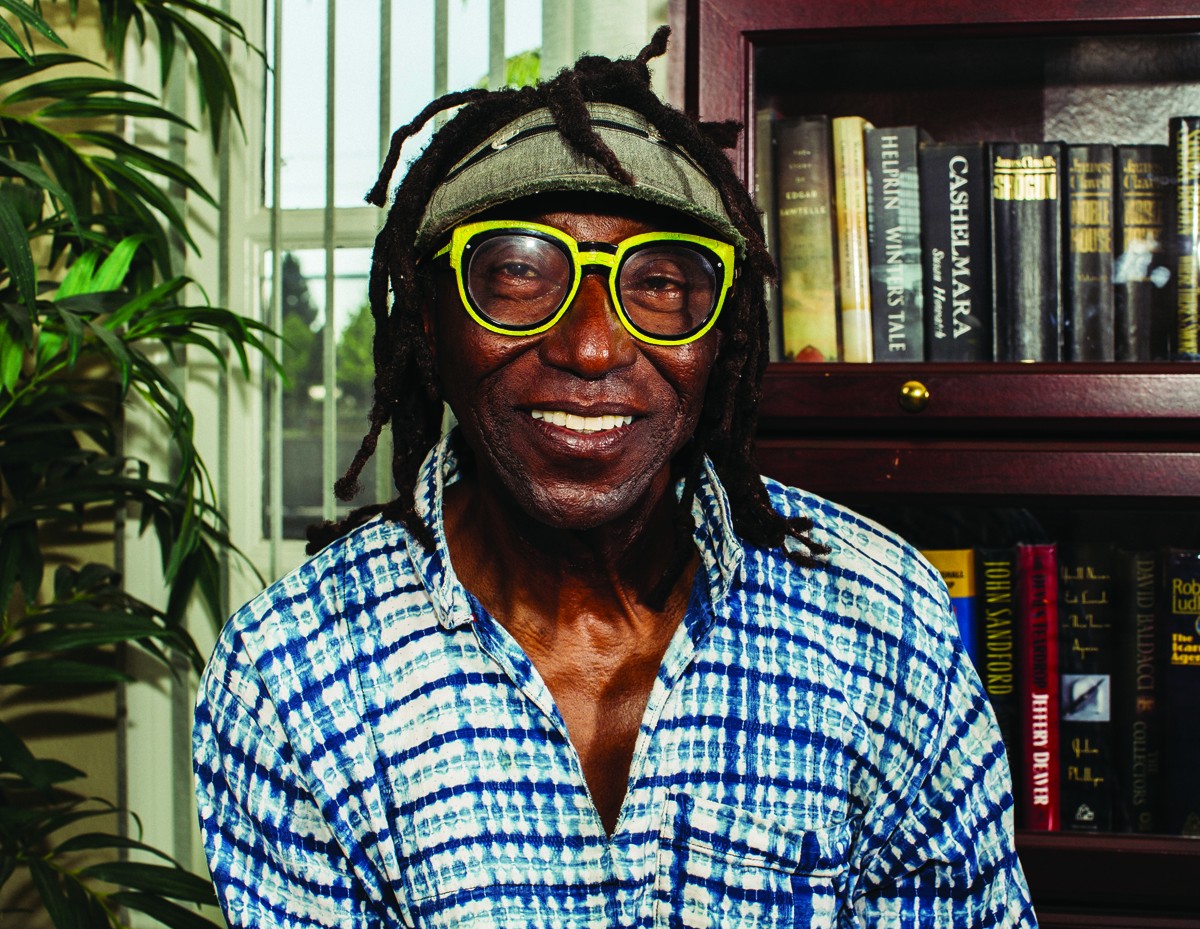
In 2003, Kiro started the nonprofit Moses Kazibwe Memorial Fund for African Children to provide goods for schools in parts of Africa still recovering from the war. He gathered funds through charity concerts and events at local spots including eVocal in Costa Mesa, Original Mike’s in Santa Ana and Surf City Saloon in Huntington Beach, as well as by way of a coin cup on the counter at his store. His shows were often a mix of local ska, reggae and punk bands, plus hand drum circles.
Through his organization, Kiro helped to build school infrastructure, install blackboards and provide materials such as pens to students in East African nations such as Congo, Burundi and Rwanda, where he is known as “The American.”
Despite his positive reputation, the Fountain Valley Police Department (FVPD) seemed to have it out for Kiro. Soon after opening his doors in ’06, FVPD started frequenting African Corner because of reports of weed and drug dealing in the area. Friends and customers including Fontes believe the police and conservative residents wanted to run the African refugee-turned-American-businessman out of town. “The police thought of him as a cult leader,” Fontes says. “They didn’t like Kiro in general—they didn’t like the color of his skin, they didn’t like the country he’s from, and they didn’t like that a lot of young people were really attached to him and believed in him, becoming stronger in their own faiths and religion by hanging out with him, so [they] needed to bring him down.”
In September 2009, FVPD targeted the shop with a sting operation. An undercover officer came in looking for a pipe, and later returned to make friendly banter. On her third visit, she asked Kiro for weed, begging him to help her with an upset stomach and painful cramps.
“I told her I don’t sell weed here,” Kiro says. “And she pushed: ‘Is there someone who can help me?'” Kiro felt bad for her after seeing her multiple times and wanted to help. He tried to just give her some weed, but she refused. “She said, ‘Oh, no, I don’t want to take your weed! Just call me somebody.'”
So Kiro called his friend David Antonio Salinas, who offered to potentially sell her $20 worth of weed to help with her cramps. When Salinas arrived, Kiro told her to go to his car, but again, she refused. “She said, ‘Oh, no! I don’t want to get it from the street; I want to get it here!'” Kiro alleges. When Salinas came inside, Kiro was arrested on a felony count of sale or transport of marijuana and a felony count of opening a location for the purpose of using and selling drugs. He served nearly a week in jail.
“It felt like five years,” Kiro says of his scary stint in county lock-up. Prior to that, his criminal record listed only parking tickets. “All of this noise: You can’t sleep; people are calling your name. I was like, ‘Oh, my God, my own government against me? To set me up? What for?'”
The FVPD declined to comment about Kiro’s arrest.
After serving minimal jail time, Kiro went back to running African Corner for several more years. “People are people,” he says. “I forgive! Life goes on.”
The shop owner’s second major encounter with FVPD came a few months later, when African Corner hosted a fundraiser for the Moses Fund. But the event was halted before it could even officially begin. At least seven cop cars with sirens barreled into the parking lot, where people were hanging out, playing hacky sack, holding hand drums and catching up with friends. “Kiro just seemed very confused,” Fontes says, “and it was almost like, even though they were shutting it down, they couldn’t shut it down because nobody was doing anything.”
[
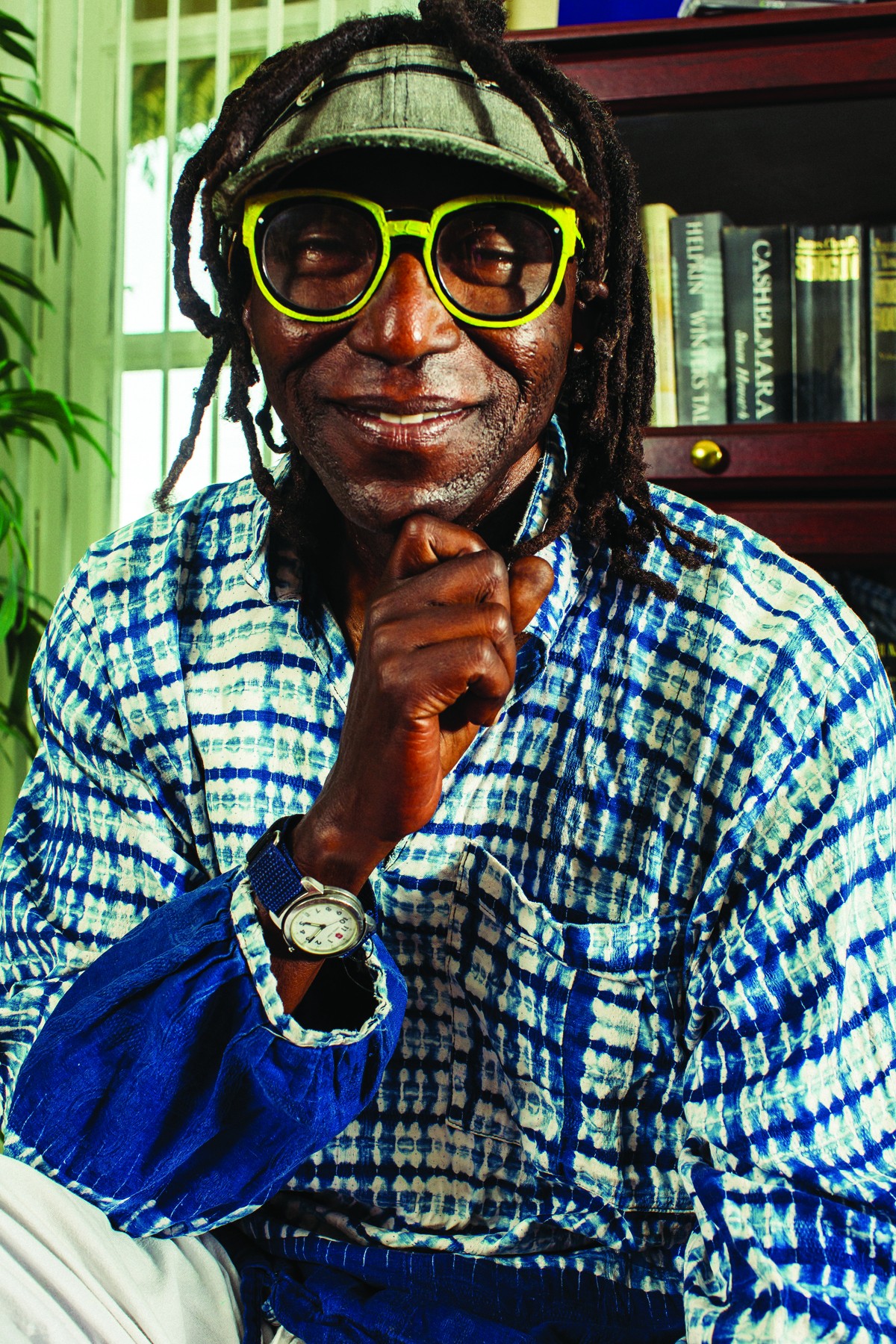
Kiro says he felt as if the police wanted some sort of revenge since he didn’t close up his store after the undercover bust. He plead with police, telling them it was an event to raise funds and awareness for East Africa, but his story fell on deaf ears. Kiro had to kick everyone out of the event and return to attendees the nearly $900 he raised.
One of Kiro’s friends offered to drive him home after the incident. Tired after a long night, Kiro wanted to go inside and go to bed, but his friend made Kiro join him for a beer inside his apartment. “I went to the refrigerator, opened the beer, gave it to him and [got] myself a beer,” he recalls. “I sit down . . . GONE. Cardiac arrest. Right there.”
Kiro was in a coma for seven days. Doctors said he had a slim chance at survival, and hospital staff asked his family, some of whom flew in from Africa, to make a decision. Everyone agreed to take him off life support—except for one of Kiro’s daughters, Mimy, who begged them to wait. “She said, ‘I don’t want to kill my dad. If he has to die, he’s gonna die anyways. I don’t want to give permission,'” Kiro says.
The family obliged and welcomed many visitors who came to cry and pray at his bedside. Another of Kiro’s daughters, Warda, visited from Atlanta. “She came to clean me. You know how you are just, how everything is black because there is no blood circulation?” he says. “They tried to make her wear gloves and a mask, and she said, ‘No, this is my dad.’ They tried to say I may contaminate her, but she said, ‘If he contaminates me, that’s okay. He’s my dad; he’s mine.'” She got a bucket and a wash towel and went to work. “She cleaned me, and she cleaned me everywhere, my face . . . I started to look nice. After she [finished], she went to leave, and I opened my eyes.”
His daughter gasped. Once again, Kiro had cheated death.
* * * * *

After recovering from his heart attack, Kiro dedicated himself to taking it easy and focusing on himself, his family and his community. He closed the store, but he continues to teach drum workshops to kids at local schools and travels to Africa every year. He hopes to write a book about his experience as a war survivor turned humanitarian. In the meantime, Kiro travels the country to visit family and loved ones. He has booked a flight to his daughter’s wedding and recently returned from a trip to Texas to watch his grandchildren play in a soccer tournament, of which he proudly shows off photos on his Facebook page.
His experiences and passion for education lead him to enroll in a new program for leaders of color in Portland, Oregon. Pan-Immigrant Leadership and Organizing Training (PILOT) is designed for immigrants and refugees and aims to help leaders understand the inner workings of city government and to gain organizing skills such as community-movement building and conflict resolution. After spending seven months immersed in the city’s culture, Kiro was inspired to open a small African Corner storefront in East Portland. At a time when most would consider retiring, Kiro has the energy of a young college graduate on the verge of something new and promising.
“When I got to OC, I didn’t have much to give anyone except love,” Kiro says. “It was just like Africa; it was just . . . people. Whatever you do, whatever vices you want, you’re just a person, so it’s no different in Orange County or Africa. Life is life. Life is short. Life is a spirit. God is love, and if you have an open heart, you will never be poor.”


Kiro your story is sad and amazing. I manage a tie dye “hippie” store in Lincoln City Or, just had a young man in here by the name, John Masters, looking for chew sticks, told me about your store and a bit about you, not nearly about what I read, where do I get them to make my customer happy? Stop in ever up this way…